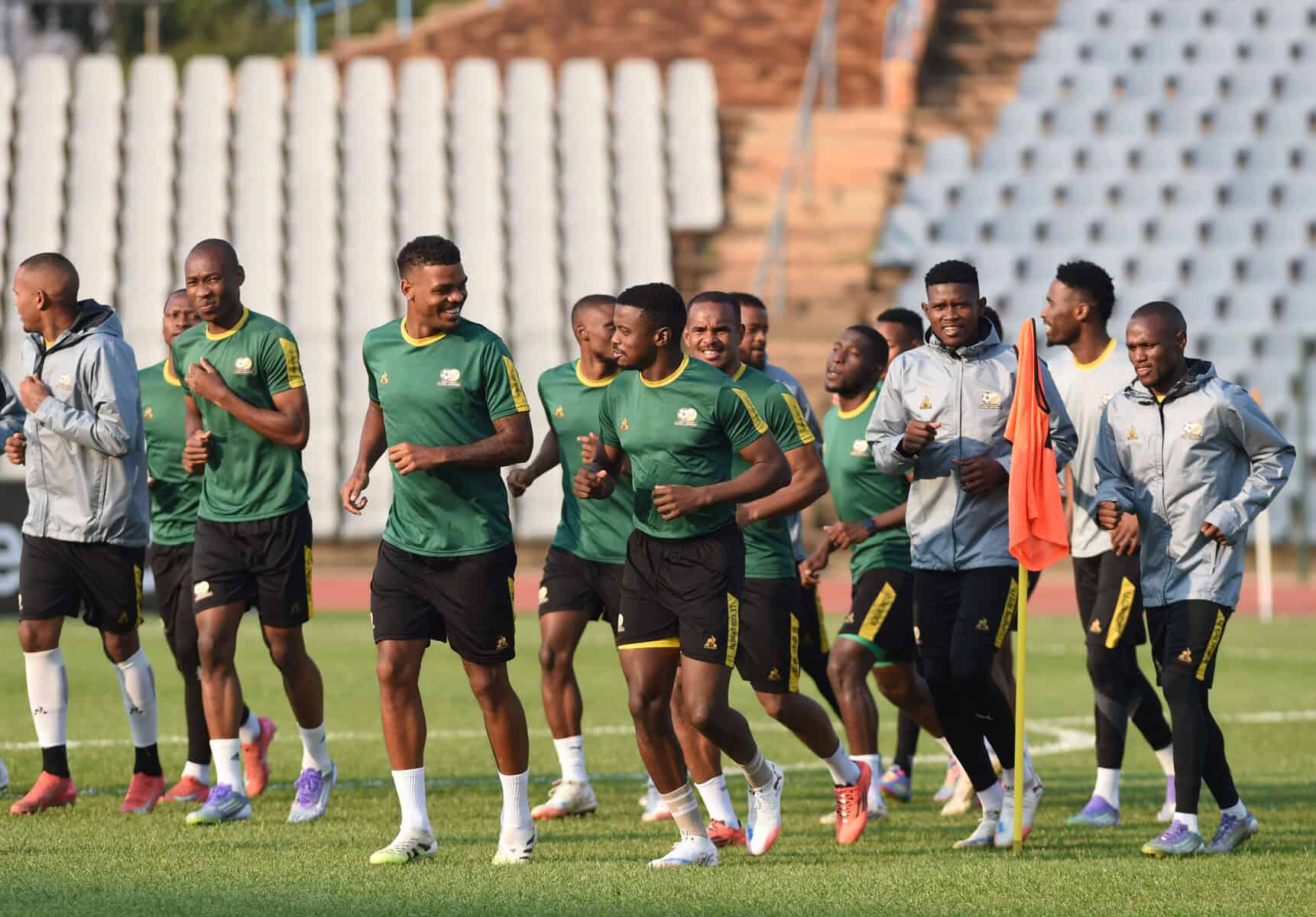There are moments in qualifying campaigns that feel bigger than a date on the calendar, and for South Africa this week is one of them. With Bloemfontein as the stage, Bafana Bafana step into a pivotal stretch of the FIFA World Cup 2026 qualifiers where composure, intensity, and belief must meet. The equation is simple enough, beat Lesotho on Friday and keep the pressure on Nigeria ahead of Tuesday.
The stakes in group C could not be clearer
South Africa sit top of Group C on 13 points from six matches, five clear of both Rwanda and Benin, and six clear of Nigeria. That buffer is precious, yet fragile, and it explains Hugo Broos’ unflinching message that Friday is a must win. As he put it, the team cannot afford to underestimate Lesotho and dropping points would hand momentum to their rivals.
Broos framed the psychology of the weekend with razor clarity. He noted that Nigeria only play on Saturday, so a win on Friday turns the screw on the Super Eagles. In qualifier football, timing matters, and a victory against Lesotho would keep Bafana’s hands on the wheel, with the chase pack forced to respond under pressure.
Venue clarity and a late switch in Bloemfontein
The Lesotho fixture is officially a Dikwena home match, yet it is being staged in South Africa because Lesotho do not have a stadium that meets Fifa requirements. The game was initially moved to Dr Petrus Molemela Stadium due to concerns about the Free State Stadium playing surface, but it has since been cleared and the match returns to the Free State Stadium. Nigeria follow on Tuesday in Bloemfontein, with fixtures listing Toyota Stadium for that match, which aligns with the same venue name.
Kick-off against Lesotho is set for 6pm CAT, live on SuperSport. With home surroundings and familiar grass beneath their boots, Bafana Bafana have an added layer of comfort that must translate into control and, ultimately, points.
Form lines that tell a story
South Africa arrive with rhythm, having won each of their last three qualifiers by two goals, against Zimbabwe, Lesotho, and Benin. That sequence has lifted them to the summit of Group C and given the team a platform to believe that the finish line is within reach. What matters now is the ability to sustain that level when the stakes sharpen.
Lesotho sit fifth in the group, two points above Zimbabwe at the bottom, and their record reads one win, three draws, and two defeats. Their recent Cosafa Cup campaign captured their inconsistencies, a 1-0 win over Malawi followed by heavy defeats to Angola and Namibia. The numbers do not make them harmless, especially given they drew in Nigeria, and that is why Broos insists respect must be paired with intensity.
Must win, and fight for every metre
Hugo Broos did not sugarcoat it, he called Lesotho a must win. He spoke about the danger of underestimating a neighbour, and he stressed the need to fight for every second and every square metre from the first minute. It was the language of a coach who knows that South Africa’s path to the World Cup can be smoothed right here, but also complicated if focus dips.
His tone was echoed by defender Siyabonga Ngezana, who acknowledged the weight of history. It has been a long time since Bafana qualified with results, and the reality of that drought fuels the squad’s edge. Ngezana added that Lesotho’s players know the PSL and that Bafana must bring their A game, a reminder that local familiarity cuts both ways and that complacency is the enemy.
Team news and the selection shuffle
There has been movement in the Bafana camp this week. Sipho Mbule and Thabo Moloisane joined up to replace the injured Patrick Maswanganyi and Ime Okon, a late tweak that tests Broos’ depth management. Broos said of Mbule that he gives them the right player in the right position, which hints at a clear role for the midfielder in these qualifiers.
Looking at the wider picture, Broos unveiled a 48-man preliminary list that underlined the influence of Mamelodi Sundowns and Orlando Pirates. The Buccaneers supplied a sizeable group that included Mbule, Relebohile Mofokeng, Patrick Maswanganyi, Kamogelo Sebelebele, and goalkeeper Sipho Chaine. Sundowns’ contingent featured Ronwen Williams, Thapelo Morena, Aubrey Modiba, Jayden Adams, Bathusi Aubaas, and Iqraam Rayners, although there are concerns over Khuliso Mudau and Themba Zwane due to fitness issues.
There is also freshness in the mix. Bongokuhle Hlongwane returned after more than a year away from the squad, and Darren Johnson earned a first call, the AmaZulu goalkeeper and son of former Bafana keeper Grant Johnson, who now works as goalkeeping coach. Rising names such as Mbekezeli Mbokazi, Oswin Appollis, and Devin Titus were included in the broader pool, while Ime Okon, a Nigerian-born defender with South African nationality, was highlighted as a potential cornerstone for the future before injury intervened. The balancing act between experience and new energy is central to Broos’ plan to maintain momentum in Group C.
Players to watch and tactical threads
For South Africa, Lyle Foster brings the scent of goals and top-flight sharpness. The Burnley forward scored his first Premier League goal of the season against Manchester United last Saturday, and with six goals in 18 national appearances, he arrives with confidence. This is the kind of window that can elevate a striker’s international profile, a few key touches and decisions can tilt a tight game.
On the other side, Lesotho’s Katleho Makateng knows South African defenders well from his two seasons at Richards Bay in the Betway Premiership. He has scored three goals in 11 caps for his country and his movement can disrupt well-drilled defensive lines. If Bafana allow the match to become stretched, Makateng has the instincts to punish hesitation, which is why control of tempo will be a recurring theme for the hosts.
The head-to-head ledger across the last five meetings is balanced, two wins each and one draw. It is the kind of record that fuels Broos’ warning about underestimation, history is a quiet teacher. Expect South Africa to look for early control of midfield, press high without recklessness, and use the crowd to pin Lesotho back for long stretches on the Free State Stadium turf.
What the coach said, and why it matters
Broos, ever pragmatic, reminded everyone that Lesotho drew in Nigeria and that neighbours can spring surprises. He is not hiding from the stakes, he is using them. A win on Friday, he said, sets the tone for the rest of the group and increases pressure on rivals who play later.
His mantra for the week is simple enough to fit on the dressing room wall, focus, concentration, and a willingness to fight for every inch. In tournament football, those habits become identities, and South Africa’s recent run of two-goal victories suggests a team that can both control and close. The challenge is sustaining that habit when the calendar tightens and the margins get thin in the qualifiers.
The weight of history and a chance to change it
There is a broader narrative running beneath every pass and tackle. South Africa have not qualified for a World Cup through the process since 2002, and while 2010 offered the joy of hosting, the wait for qualification by results has stretched too long. Under Broos, optimism has returned, anchored by a bronze medal at the 2023 Africa Cup of Nations and a group-stage campaign now in their hands.
That is why this week feels defining. An opinion that resonates around the country argues that failure to qualify from here would rank among the biggest missed opportunities for Bafana in modern times. There are four games to play, starting with Lesotho and then Nigeria in Bloemfontein, and if South Africa take care of business, the dream of a place in North America begins to look like a plan rather than a wish.
The table, the timing, and one cloud of uncertainty
While the log tells a positive story, one unresolved issue lingers. There remains the possibility of a points deduction relating to the fielding of suspended midfielder Teboho Mokoena in the March win over Lesotho, with Fifa yet to rule on the matter. Nigeria coach Gernot Rohr called the situation abnormal and said it is very strange to be playing without clarity on the standings.
That uncertainty sharpens the importance of Friday and Tuesday. The simplest way to manage noise is to keep winning, and that is the only thing the players can control. Until a ruling arrives, Broos and his team will work on the assumption that every minute and every point counts, and that the only protection against off-field turbulence is on-field authority in Bloemfontein.
What Bafana need to do this week
- Control the first half against Lesotho with tempo and patience,
- win midfield duels to unleash the forwards with cleaner service,
- protect set pieces and transitions to avoid giving up cheap chances.
Why Lesotho still demand respect
Lesotho’s draw in Nigeria is a handbrake on complacency. The Crocodiles can be compact, they are familiar with South African football rhythms, and they carry threats that punish lapses. For Bafana, the mental task is to treat this like a knockout, impose authority early, and avoid giving the underdog belief.
Recent Cosafa Cup results also frame their volatility, a narrow win, then heavy defeats. If South Africa play with their current standard, the gap in quality should show, but if the game gets scrappy, the ambition of a shock result grows. That is why Broos’ emphasis on fight and focus has been repeated so often, it targets the moments when matches can flip with one mistake.
Leadership, personalities, and the human side of pressure
Captain Ronwen Williams offers calm from the back, a goalkeeper whose voice carries weight when nerves tighten. Around him, the blend of seasoned internationals and returning faces in camp creates a dressing room that understands both the scars of missed chances and the taste of recent progress. They know what it means to return the national team to the biggest stage, it is a chance to rewrite a chapter that has stretched over two decades.
For the younger faces, this is a classroom of consequence. Training alongside senior pros while preparing for a week like this can accelerate growth in ways no friendly can. If Bafana do qualify, the culture forged here will be part of the legacy, and for Broos, who has spoken about stepping away before or after the World Cup, the significance of that legacy is unmistakable and personal.
Broadcast details and the rhythm of the week
Friday night under the Bloemfontein lights will come quickly, then everything resets for Tuesday when Nigeria arrive. SuperSport carries the Lesotho match live at 6pm CAT, and the energy in the stands will mirror the urgency on the pitch. A positive result, and the city becomes a springboard for a statement in the next match.
By the time Saturday morning headlines roll in, everyone will know whether South Africa have placed the burden onto Nigeria or invited them back into a chase. That is the beauty and the bite of qualifier football, it demands answers on a short clock and rewards those who find clarity fastest. In weeks like this, identity is not discussed, it is proven in ninety pulsating minutes at the Free State Stadium.
The final word before kick-off
Broos has given his team a clear compass, respect the opponent, own the moment, and fight for every metre. Ngezana has voiced the reality that the nation hears as well, that qualifying through the front door is overdue and non-negotiable. Between those statements lies the task, translate confidence into control and pressure into performance.
Win Friday, and the narrative tilts in Bafana’s favor heading into Nigeria. Slip, and the group becomes a brawl again. The margins are fine, the emotions are raw, and that is precisely why this week in Bloemfontein could be remembered as the moment South African football chose conviction over anxiety and turned ambition into achievement.






